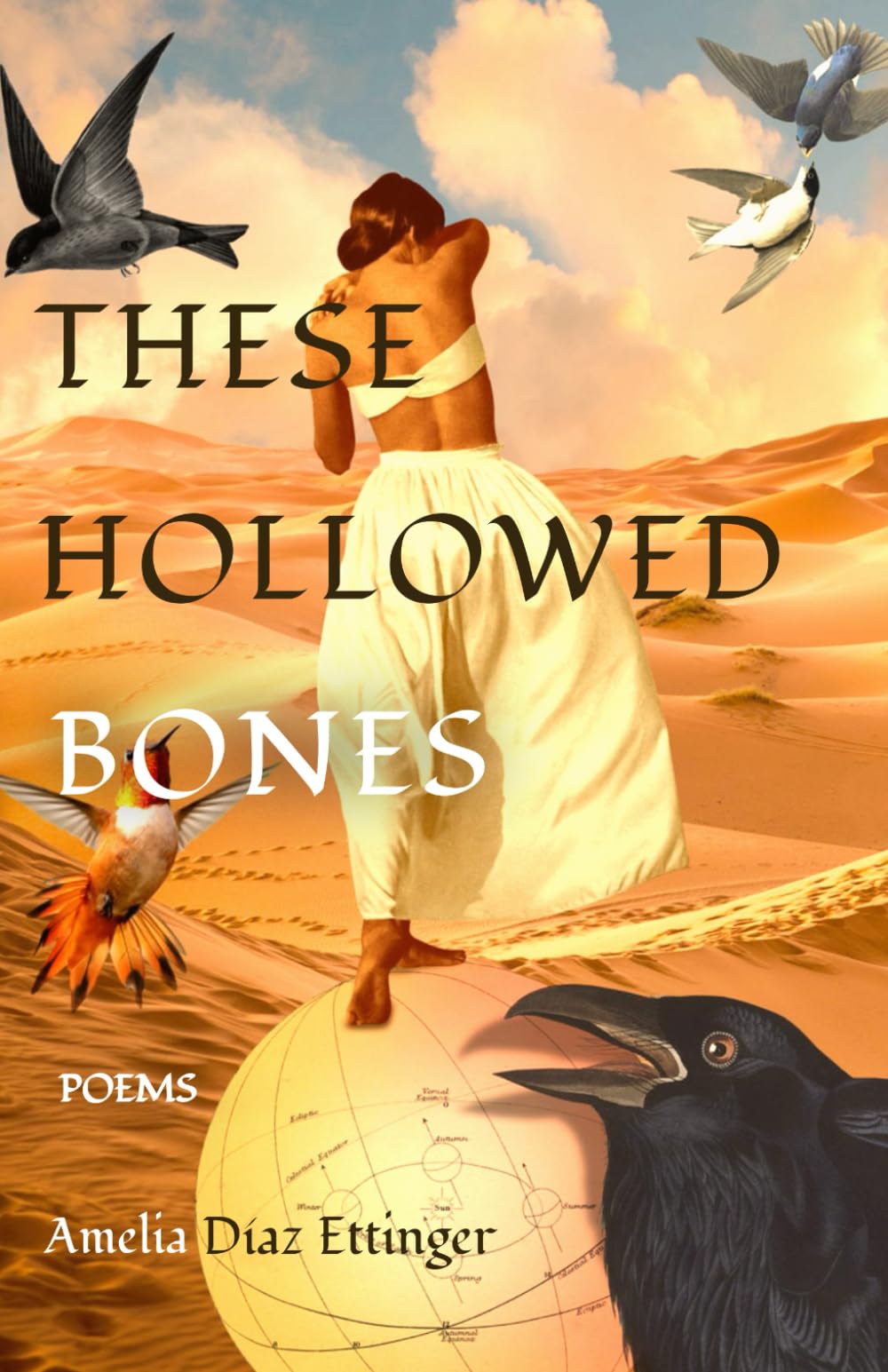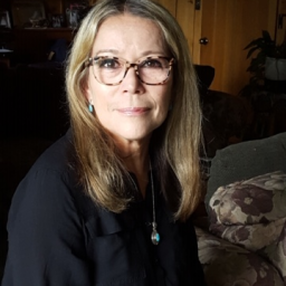Published December 30th, 2024
Review
by Joyce Bou Charaa
On her blog, Amelia Díaz Ettinger describes herself as a writer of poems and short stories “that reflect the struggle of identity found in immigrants.” Born in Mexico and raised in Puerto Rico, she later moved to the United States with her family. As an immigrant, Díaz Ettinger uses her writing to give voice to the inner struggles she faces, like the feelings of despair and the loss of home. These themes, among others, are widely expressed in her latest poetry collection These Hollowed Bones (Sea Crow Press, 2024).
Díaz Ettinger is an immigrant poet who seeks to find herself within the birds of her poems. The longing for home weighs on her heavily, and birds serve as a connection to her homeland, her past, and her search for identity. As a bird-watcher, the author reflects on how, for birds, home is wherever they build their nests. Yet, her home feels far away. Each bird in her collection carries a story, reminding Díaz Ettinger to keep singing despite all the circumstances she’s going through in life. Inspired by nature’s resilience, she looks to birds as symbols of survival and freedom, drawing strength to rise above her struggles and to discover her true self through nostalgic words, such as in “Towhee”:
makes me wonder
how can she be so content
in her noisy rummage
among dead leaves
that startles me awake?
such a necessary reminder
to sing

In These Hollowed Bones, there are more than 40 poems, all written in free verse. The titles of the poems are the names of birds in both the English and the Latin language, including birds like the Turkey, Towhee, Grackle, Owl, and Winter Bird. For some of these birds, Díaz Ettinger describes their unique traits and explores the emotions they evoke in her. She talks about their ways of life in nature, adapting to different seasons and surviving extreme climates — but also going extinct. In “Ivory-Billed Woodpecker,” the speaker takes on the voice of an extinct bird, reflecting on what could have been done differently to avoid extinction, ultimately highlighting a resilience that proved insufficient:
we could fly for miles
without the sight of soil
that wonderful cover
of roots and joy
The Crested Caracara, also known as the Mexican Eagle, holds a special place in the author’s heart. She dedicates a poignant poem to this bird, weaving stories of its resilience and cultural significance. Through her verse, Díaz Ettinger expresses a deep longing to explore the culture of the country she was born in, lamenting her departure from her homeland and the growing distance from its voice and spirit:
how i wish i had grown
with her voice—my flight from her shores
my shortfall
Díaz Ettinger uses birds as a lens through which to examine the immigrant experience. Through her poetry, she seeks to delve into her soul and the natural world, finding connections that help her express the profound feelings of loss and longing for home. For the author, nature serves as a mirror, reflecting the universal struggles and emotions that reside within every human heart.

The lives of both immigrants and birds share a striking similarity: They often travel from one place to another in search of home, but at the same time they can build homes wherever they fly. For people, home isn’t always simply a physical location either: It is changeable and unchangeable at once, a place where the heart truly belongs. This profound truth lies at the heart of Díaz Ettinger’s poetry, where she reflects on the immigrant’s journey and the longing for a home. In “Brewer’s or Grackle,” she remembers the Grackle from home, while she can only watch the Brewer where she currently resides:
but the Grackle is not here in this colder climate
here the aloof Brewer’s, secretive but for singing
his own cacophonous song to his immediate brood
i can sense he doesn’t feel the loss of homeunlike me, his home is home—where the nest rests
its twiggy cup near brothers and sisters
a loose colony of familiar ancestry—my jealousy
at least for this summer, for this breeding season
Aside from the personal and emotional aspects of these poems, Díaz Ettinger also draws attention to the ecological impacts that humans have on birds. Just like the Ivory-Billed Woodpecker draws attention to the issue of deforestation (“we thought the trees / —those stately gods / would stay forever”), the Sooty Tern experiences ecological disaster at a place that they deemed “—Safe—”:
a mighty small word
when all their white and black feathers darkened the skyjust seconds, while thousand
of Sooty Terns bathedon a sea of rust
the inferno that followedcharred the anxious waiting families
sitting peacefully at their nests
Similarly, in “Brown Pelican,” the speaker is a Brown Pelican that takes note of an oil spill: “I’ve never seen the ocean gray / —no, not gray— black / with a sheen that reflects / my flight, it blinds me.”
Birds take on a truly versatile role in Díaz Ettinger’s poetry collection. The author poignantly captures the emotional struggle of losing her sense of home while also shedding light on the perilous conditions that nature and birds experience in the face of climate change. Through evocative verses, she explores the devastating consequences these crises pose to ecological life and humanity alike.
Nationality: Lebanese
First Language(s): Arabic
Second Language(s):
English,
French
Supported by:

